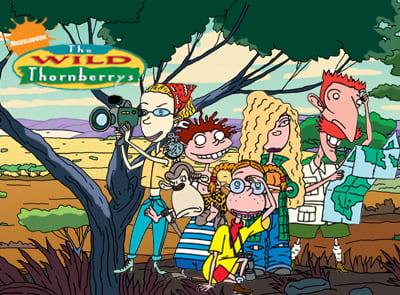Weirdly enough my favourite show as a kid was ‘The Wild Thornberrys’ and I would be lying if I said it didn’t change my life. It aired from 1998 to 2004 on Nickelodeon and the movie came out in 2002.
If you haven’t had the wonderful experience of watching ‘The Wild Thornberrys’ then its basically about a girl named Eliza that can speak to animals, her family lives in a caravan whilst her dad hosts a nature show and the mum films it. The family travel all over the world and Eliza gets into all kind of situations and the ability to speak to animals gets her out of them. I was inspired at a young age by this show and it wasn’t because I wanted to speak to animals, it was because she would travel all around the world and meet so many different people from different cultures and ethnicities. She got to experience what their lives were like by getting involved in their cultural norms and practices. Whilst all of my friends were worried about missing the new Hannah Montana episode I was getting ready to watch reruns of ‘The Wild Thornberrys’ – seeing most of the episodes 3 if not 4 times each. Each episode stuck with me differently specifically when she went to Peru and lived with the native Incas, when she went to Brazil and got stuck in an ancient temple, and when she went to China and got involved in a Chinese festival whilst she was trying to save some pandas.
I’ve always believed that it’s extremely important to understand the past, and if we can understand the past then we can understand the future. However, I don’t think that a true understanding lies in numbers and data, I believe that it sits in culture, people and understandings. This was reinforced to me by Dr Madhavi Manchi’s lecture on qualitative research and specifically ethnographic fieldwork. Dr Manchi spoke about how if you really want qualitative research then you have to be involved. You can’t sit back, watch and write as you are never going to truly understand the place where you are. The people living in these societies will never show you who they truly are unless you are getting involved and showing them that you want to learn and understand.
If it wasn’t for ‘The Wild Thornberrys’ I wouldn’t have found my passions for learning about other people and cultures different from my own. I still find it amazing though that a show for children actually has a real degree – Anthropology. I may have not been able to convince my parents when I was younger of taking up the lifestyle of the ‘Thornberrys’ but you can guarantee I will be when I finish Uni.




This is such a lovely post! I love how you linked this amazing show to Dr Manchi’s lecture. My favourite quote from her lecture was that, in qualitative research, the researcher has to be a “fly in the curry”, not a fly on the wall. I think your blog post beautifully articulates how this is the case, and how important it is to contribute to the community that research is conducted in, truly valuing the people that are involved.
Love this!
So often we underestimate the power of what we consume in our childhoods. What we watch, what we read, what we interact with shapes us; especially when we were watching these favored movies or episodes over and over again (which I definitely relate to!).
It’s why representation is so important; not only when we can understand its impact, but before then – it should be standard to normalise a mixed-race, multicultural world from a young age because that’s what our world is! There needs to be more quality content being created for kids that introduces them to ideas, jobs, people and situations beyond their homes and families to encourage the open-mindedness, awareness, and empathy that the world is constantly proving we sorely lack.